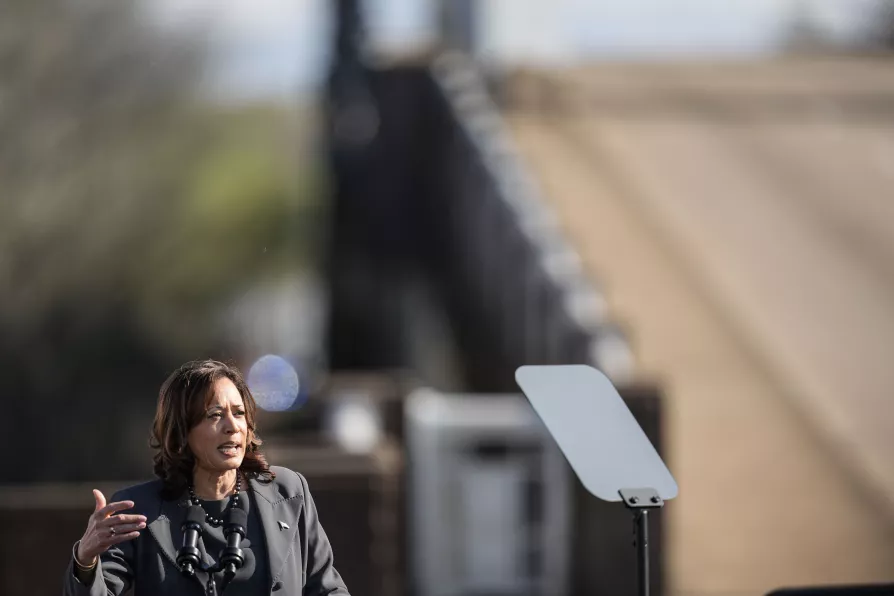This weekend, the NEU holds a special conference to debate changing its approach to organising teaching assistants, which a 2017 TUC agreement forbids. General secretary DANIEL KEBEDE outlines the choices before delegates

 Vice President Kamala Harris speaks before walking with others across the Edmund Pettus Bridge commemorating the 59th anniversary of the Bloody Sunday voting rights march in 1965, March 3, 2024, in Selma, Ala
Vice President Kamala Harris speaks before walking with others across the Edmund Pettus Bridge commemorating the 59th anniversary of the Bloody Sunday voting rights march in 1965, March 3, 2024, in Selma, Ala
SPEAKING at one of the civil rights movement’s most sacred sites — the Edmund Pettus Bridge in Selma, Alabama — Vice-President Kamala Harris uttered a phrase that has up to now seemed impossible for anyone in the Biden administration to let slip from their lips — “immediate ceasefire.”
Harris was addressing an audience of thousands gathered for the 59th anniversary of the “Bloody Sunday” attacks. In 1965, police beat civil rights activists there, most of them black, who dared demand the right to vote. The assault became a key moment in the fight against racism in the South and for civil rights nationwide.
The bulk of the vice-president’s remarks were aimed at reminding US citizens that the “fight for freedom is not over,” and she pointed to attempts by Republicans across the country to limit early voting, absentee voting, and gerrymander districts to limit the political power of people of colour.
It was Harris’s comments about Israel’s war in Gaza, however, which stole headlines around the world.
Of course, the US vice-president didn’t characterise the war as the genocide of Palestinians that it really is, but given the complicit stance that the Biden administration has taken so far, her words suggest that the mass ceasefire sentiment sweeping the country is putting heat on the White House.
Compelled to act
“Too many Palestinians have been killed,” she began, before turning to what has now become known as “The Flour Massacre” in Gaza City. “Just a few days ago, we saw hungry, desperate people approach aid trucks, simply trying to secure food for their families after weeks of nearly no aid reaching northern Gaza. And they were met with gunfire and chaos.”
Discussing the immense suffering caused by the war, Harris forcefully declared: “Let’s get a ceasefire! Let’s reunite the hostages with their families, and let’s provide immediate relief to the people of Gaza!”
When cheers erupted from the crowd, it felt for a moment like the Biden administration had joined the movement protesting the foreign policies of the Biden administration. Harris acknowledged that “people in Gaza are starving” and “the conditions are inhumane.” Recounting some of the horrors Palestinians face, she said, “Our common humanity compels us to act.”
She’s right; people of decency should certainly be moved to take action. So, in what ways is the Biden-Harris government feeling compelled to act?
Is it feeling compelled to cut shipments of weapons to the Israeli military — weapons which are being used to maim and murder Palestinians every single day?
No.
Is it feeling compelled to exert the powerful influence of US imperialism to force its ally Netanyahu to halt the march of his war machine?
No.
Is it feeling compelled to restore the funding it cut to UNRWA, the aid agency for Palestinian refugees?
No.
Is it feeling compelled to stop vetoing internationally-backed resolutions at the UN calling for a ceasefire?
No.
Is it feeling compelled to join the South African genocide case against Israel at the World Court?
No.
So what is this? Are we just witnessing a good cop-bad cop strategy? Harris throws a bone to the ceasefire movement while Biden keeps approving missile shipments to Tel Aviv?
Peace movement power
Taken as a whole, it has to be said that Harris’s critique of Israel’s brutal offensive was relatively mild compared to what UN experts and lawyers at the International Court of Justice have said on the matter.
But it’s important, nonetheless, because it shows that Biden’s re-election campaign has been compelled to stop ignoring the millions of angry US citizens upset over the president’s backing for Netanyahu.
It is no coincidence that this hint of a course change from Harris came just days after 101,000 Michigan voters cast “uncommitted” ballots in the Democratic primary and after a major trade union called on voters in other states to do likewise.
With polls showing Biden splitting the unity of his own coalition with his stance on the war, the Democratic Party has little choice but to go into damage control mode.
That’s why the nationwide movement for a ceasefire cannot let up. Harris’s remarks prove that those who demand peace in the Middle East have leverage, and they must continue using it. Keep marching. Keep petitioning. Keep voting uncommitted. Keep demanding, as Senator Bernie Sanders said this weekend, “not another damn nickel” for Netanyahu to keep up the slaughter in Gaza.
Even if a temporary ceasefire is agreed to in the coming days, it can’t be taken as a signal to ease the squeeze. Activists should remember that there was previously a temporary ceasefire in November and December. After it ended, the IDF’s rampage resumed, and the death toll in Gaza doubled — from 14,500 to over 30,000.
What’s needed now is not just an immediate ceasefire, but a permanent ceasefire and negotiations to not just release hostages (on all sides) and get aid in, but to achieve lasting peace. That ultimately means cutting off US support for the apartheid policies of the Israeli state, ending the occupation of Gaza and the West Bank, and moving toward a two-state solution.
This article appeared on Peoplesworld.org.

Israeli media awash with leaks and rumours of Netanyahu’s plans to seize Gaza. Meanwhile, the unrelenting siege of Gaza continues unabated

Barely 100 trucks enter as bombs kill another 60












